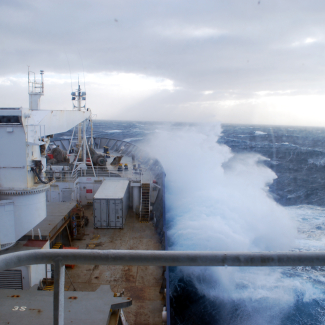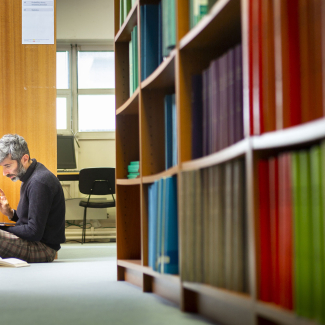
Sustainable development
The CNRS is committed to providing responses to the planetary challenge of climate change. Through its research and innovations, it plays a role in a global dynamic structured around the sustainable development goals defined by the UN.
What are the UN sustainable development goals?
The UN has set 17 major goals that aim to make our societies fairer, more peaceful and more sustainable, taking into account planetary limitations and in the context of global change. They are founded in scientific understanding and they require the involvement of everyone.
What are the concrete initiatives that the CNRS has put in place?
The CNRS generates knowledge that is used to work towards the sustainable development goals (SDGs): The freedom and the creativity its researchers enjoy means that they can make discoveries and contribute to innovations that work towards the SDGs.
It plays a role in national and international initiatives such as the French National Observatory on the effects of climate change, and the Foundation for Biodiversity Research. It leverages the expertise of its researchers on United Nations panels for climate and biodiversity (IPCC, IPBES). In fact it is one of the major worldwide contributors of data used by the IPCC. It steers or co-steers a number of Priority Research Programmes and Equipments (PEPR) that are focused on societal and environmental challenges.
- The 'Decarbonisation of Industry' acceleration PEPR| CNRS
- The 'Decarbonated Hydrogen' acceleration PEPR | CNRS
- The 'Recyclability, Recycling and Reincorporation of Recycled Materials' acceleration PEPR | CNRS
- The 'Solutions for a Sustainable City and Territorial Innovations' acceleration PEPR | CNRS
- The 'Bridge' (south-west Indian Ocean) exploratory PEPR | CNRS
- The 'FairCarbon' (carbon) exploratory PEPR | CNRS
- The 'OneWater' (water) exploratory PEPR | CNRS
- The 'Subsoil' (resources) exploratory PEPR | CNRS
- The 'Solu-BioD' (nature-based solutions) exploratory PEPR | CNRS
- The 'Traccs' (climate) exploratory PEPR | CNRS
Finally, the CNRS acts directly in terms of trying to reduce its own environmental impact, with the implementation of a low carbon transition plan and the creation of a network of sustainable development officers across all its institutions. What is the purpose of this? To measure and reduce the environmental impact of activities involved in research and supporting research, build on sustainable initiatives in the units and raise staff awareness.
It also takes part in and supports the research group Labo1point5, which produces tools and methods that show trajectories for reducing the environmental impact of research.
The CNRS and the 17 SDG
1. No poverty
A number of scientists played a role in the annual report (2017-2018) of the Observatoire National de la Pauvreté et de l'Exclusion Sociale (ONPES) “Mal-logement, Mal-logés ». Que signifie d’être mal logé dans la France d’aujourd’hui ?” (Poor housing, poorly housed”. What does it mean to be poorly housed in today’s France?)
2. Zero Hunger
The CNRS has created the OVALIE platform to study food behaviours through understanding the influence of physical and social contexts.
3. Good Health and Well-Being
There are multiple factors that affect the evolution of our health. CNRS research in the field aims to understand the links between genomes, cancer, reproduction, lifestyles and the environment, especially with regard to effects caused by endocrine disruptors. A new discipline has been founded through this work - health ecology.
Discover other CNRS actions in support of health and well-being
4. Quality Education
Scientific studies by the CNRS have shown that the capacity for learning that each person has throughout their development depends on the reciprocal influences of learning and language, the development of the child and cultural identities. Since 2017, the CNRS has also built on its social media presence by launching a YouTube channel, “Zeste de Science” (#ZdS) that decodes the latest science news and research that it has carried out.
5. Gender equality
The CNRS is involved in a number of European projects that are working on gender parity. In particular, it coordinated and co-funded the GENDER-NET Plus (2017-2022) initiative, which included 13 innovative cross-national research projects. In 2018, the CNRS also founded a committee to promote parity and equality in the workplace and launched its Mission for Women’s Integration (MPDF). Its role is to set out and monitor the action plan for parity and to coordinate its implementation and its network of equality officers across all regional offices.
Discover other CNRS actions in the fight for gender equality
6. Clean Water and Sanitation
Several CNRS laboratories are involved in the School of Integrated Watershed Sciences (EUR H2O'Lyon), which aims to shape and develop new research to address water-related issues.
7. Affordable and Clean Energy
The MYRTE and PAGLIA ORBA platforms are among the rare installations throughout the world that are capable of studying the pairing of renewable energy and storage in real world conditions. Connected to the EDF network, they supply electricity equivalent to the consumption of 200 homes.
8. Decent Work and Economic Growth
Questions about work, workers and their organisations are at the heart of numerous studies carried out by CNRS teams. By adopting the European human resources strategy for research (HRS4R), the CNRS has also committed to a continuous improvement approach that aims for the recommendations of the European Charter for Researchers and the Code of Conduct for the Recruitment of Researchers to be taken into account more effectively.
9. Industry, Innovation and Infrastructure
Scientists at the Grenoble Applied Economics Laboratory (GAEL) are carrying out work into the determinants of innovation, business strategies and how they are contracted, and also the effects of public policies on innovation.
10. Reduced Inequalities
The Centre for Indian and South Asia Studies (CEIAS) is leading research in history, anthropology, sociology and political science focused on the theme “Social space, power and inequality”.
11. Sustainable Cities and Communities
SIMBAD (Simulation of mobilities for sustainable conurbations) is a model that simulates interactions between transport and urban planning at the scale of a large town and its suburban spaces. This was developed by the Transport, Urban Planning and Economics Laboratory in Lyon and evaluates the environmental, economic and social impact of public policies.
Discover other CNRS actions in the field of sustainable cities
12. Responsible Consumption and Production
The start-up Econick, founded in August 2016, produces nickel salts from a plant that is termed a hyperaccumulator, as it extracts the metal from the soil. The patented process is the result of a collaboration between the Reaction and Process Engineering Laboratory and the Laboratory of Soil and Environmental Sciences.
Discover other CNRS actions in responsible consumption and production
13. Climate Action
The Climate, Norms and Interdisciplinary Perspectives (ClimaLex) research group is made up of scientists who have a background in law to advance discussions on the question of normativity at work in the field of climate change.
Discover other CNRS actions in the fight against climate change
14. Life Below Water
The European project GENIALG aims to create value from seaweed and its various transformation processes that can be put to multiple uses in food, cosmetics and biomaterials. Sargassum, which has become the scourge of some coastlines, could be transformed into a resource!
15. Life on Land
The PELAGIS observatory takes part in the worldwide effort to define the conservation status of marine megafauna and it has made public 180,000 data based on observations from their geographic positions, distributed across the 11 million km2 of marine waters that are under French sovereignty in the Atlantic, Pacific and Indian oceans.
16. Peace, Justice and Strong Institutions
The Normandy Chair for Peace was inaugurated in June 2019 by its three founding members: the Normandy region, the University of Caen and the CNRS. The core goal of the Chair is to build a legal framework to protect the environment, the human condition, humanity and even nature.
17. Partnerships for the goals
Through the Future Earth platform, the CNRS deploys the expertise of its researchers to actively participate in European and multilateral consultation forums on scientific topics of global importance that impact the SDGs significantly.
Contact : agenda2030@cnrs.fr
Photo credit : © Hubert RAGUET / LECA / CNRS Image

